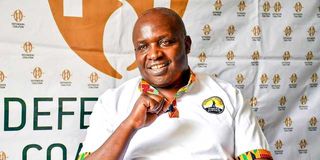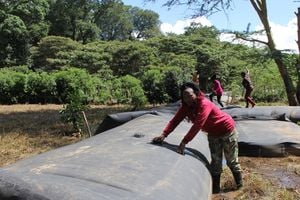New guidelines to boost women’s rights defence

National Coalition of Human Rights Defenders in Kenya (Defenders Coalition) Executive Director Kamau Ngugi.
What you need to know:
- The guidelines set out approaches that African states and the African Union human rights institutions need to apply nationally and regionally to strengthen legal frameworks on the protection of the defenders.
- They further provides practical advice on steps that can lead to the effective adoption of gender-responsive legislative, policy and administrative measures.
A guide and guidelines document has been launched for the protection of women human rights defenders in Africa.
It acts as an information resource and sets out a legal and policy framework that guarantees the rights of women human rights defenders and establishes obligations to respect, promote and fulfil these rights by African states.
It also sets out approaches that African states and African Union human rights institutions need to apply nationally and regionally to strengthen legal frameworks on the protection of the defenders, and further provides practical advice on steps that can lead to the effective adoption of gender-responsive legislative, policy and administrative measures.
The guide and guidelines, developed by Equality Kenya in partnership with African Union and UN Women, also inform advocacy strategies to promote the implementation of state obligations towards the rights of the rights defenders.
The organisations hope the states can use the information to design country-specific legal and administrative measures and strategies to fulfil their commitments to protecting human rights defenders.
Positive results
Speaking during the launch in Nairobi, Judy Gitau, the regional coordinator, Equality Now said she is optimistic that the guidelines will contribute to the achievement of positive results through the passage of laws and policies and the establishment of mechanisms to protect them.
“One of the positive outcomes we are working towards with the publication of these guide and guidelines is the continued enhancement of the capacities of women human rights defenders, their coalitions and networks in the areas of policy advocacy, campaigning and engagement with protection mechanisms at the national, regional and international levels,” said Ms Gitau.
Zebib Kavuma, the deputy director, UN Women East & Southern Africa Office, commended Equality Now for heading the initiative, saying it provides practical measures of protection. Ms Kavuma noted that women human rights defenders often speak and defend the vulnerable in society, a situation that puts them in danger.
“Through their work, they are often seen as challenging the status-quo, which, at times, leads to attacks by state and non-state actors. They are also threatened and intimidated to silence them.”
Birgitte Markussen, head of the EU delegation to the AU, observed that women human rights defenders are vulnerable when they challenge social stereotypes.
“Women human rights defenders make a difference every day and continued attacks on them are worrying. The guidelines are crucial tools to protect them and the EU is committed to supporting the role of human rights defenders in the community,” she said.
Remy Ngoy Lumbu, the chairperson of the African Commission on Human and Peoples' Rightsand Special Rapporteur on Human Rights Defenders and Focal Point on Reprisals in Africa, noted that women play a critical role in fighting discrimination, hence the need to have them protected.
“Many of them are killed, face sexual harassment and violence. We need to make the environment they are working in secure and peaceful,” said Mr Lumbu.
He underscored the need to put in place agencies to look at the injustices against human rights defenders. Lumbu termed it sad that some state and non-state actors were behind plots against women human rights defenders.
The Executive Director of Defenders Coalition, Kamau Ngugi, said women human rights defenders are at great danger of being killed and attacked. Mr Ngugi revealed that five women rights defenders were killed in Kenya between 2021 and 2023.
“Statistics show women rights defenders are at risk more than their male counterparts. Over 70 per cent of those seeking psycho-social support from my organisation are, for example, women. During protests, many of them are arrested and usually subjected to a lot sexual harassment.”
Murders
In Kenya, women rights defenders have been living in fear following several brutal murders of their colleagues. Last year, Elizabeth Ibrahim Ekaru, a leading human rights defender in Isiolo, was murdered over her work.
The mother of five was stabbed to death at Kambi Garba, allegedly over a land dispute. The incident occurred within the same area where her husband and son were killed 11 years earlier following ethnic clashes that left 10 people dead and over 20 houses torched. Another woman human rights defender and environmentalist Joannah Stunchbury was shot dead in 2021.
Stunchbury was killed for allegedly standing up to environmental injustice in Kiambu forest. She had opposed attempts by powerful local businessmen to build in the forest, and had received death threats.
Two women environmental activists, who were pursuing justice for residents and victims of environmental pollution in August 2021 from the Owino Uhuru area of Mombasa, pollution were also featured in the statement by the organisations.
According to Front Line Defenders, at least 331 human rights defenders promoting social, environmental, racial and gender justice in 25 countries were murdered in 2020. The advocacy group added that scores more were beaten, detained and criminalised because of their work.
In 2021, 358 human rights defenders were murdered in 35 countries. A larger proportion of murdered defenders were women and transgender women, 18 per cent of the total killed compared with 13 per cent in 2020.





